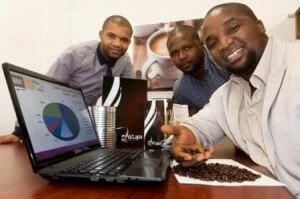
Only a few young entrepreneurs like Roland Jordaan, Mbuleli Kralo and Knight Mali of Ya Lapa Coffee have used the Gro-e-Youth Scheme for funding.
Youth-owned businesses are failing to take advantage of the opportunity to secure up to R50 million in funding from the recently launched Gro-e Youth Scheme, a partnership between the Industrial Development Corporation (IDC), the Small Enter-prise Finance Agency (Sefa) and the National Youth Development Agency (NYDA).
The initiative aims to provide funding and support services to youth-owned businesses.
According to Billy Cobbinah, senior account manager at the IDC responsible for the management of the scheme, there have been interest from business owners but the quality of the applications have been poor.
He says only two applications have been approved so far.
To improve their chances of being successful, Cobbinah suggests that business owners should get in touch with the NYDA to get their business plans to a bankable state before applying to the IDC.
“They should also please check our website and check our mandated sectors to see if a deal is applicable to be funded by the IDC, otherwise they should apply to Sefa for consideration,” says Cobbinah.
Port Elizabeth business owner Roland Jordaan agrees with Cobbinah and says this is exactly what he and his business partners did when applying for R8 million worth in funding from the Gro-e Youth Scheme in September.
“We went straight to the local IDC offices. They were very helpful and gave us advice on what to do when applying. I recommend going to their offices instead of applying online because it is better to present your idea to a person. Online there is no personal interaction,” says Jordaan.
Jordaan, who is starting up Ya Lapa Coffee local coffee supplying business with partners Knight Mali and Mbuleli Kralo, says the three identified a gap in the coffee industry after doing research.
“South Africa is a net importer of coffee, which means we import more coffee than we export, when our lands are actually suited to growing coffee. There also aren’t many businesses, if any, providing a basket of options to retailers and supermarkets,” says Jordaan.
Another important finding in the research was that coffee, a multi-billion rand industry and the world’s second largest traded commodity after petroleum, can be grown in the Eastern Cape, close to where one of the three is originally from. A business plan detailing the nature of the business was submitted to the IDC and, according to Jordaan, they have been in regular contact with the IDC’s due diligence team, who have been very helpful in fine-tuning the business plan to ensure the application for finance has a better chance at being successful.
Business owners interested in applying can approach any of the three institutions for funding and business support.
Cobbinah says business owners could qualify for a maximum loan of R50 million.
The loans are offered at prime less 3% to businesses that are able to create new jobs and that operate in industries falling within the IDC’s mandates such as the green, manufacturing, automotive, agricultural, mining and tourism sectors.
Both startup and existing businesses qualify for funding, while youth shareholding should be at least 50% plus one share.

